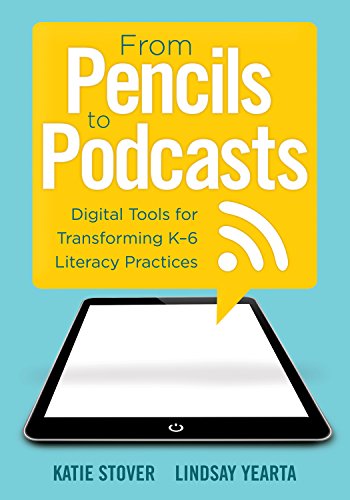Fully embedding technology into the curriculum is key to preparing students to meet the demands of the 21st century. The authors provide K-6 teachers with practical suggestions for incorporating technology into familiar literacy practices and illustrate ways technology can deepen students' literacy development. Each chapter includes information about easy-to-use technology tools, examples from real classrooms, and step-by-step instructions to get started.
Use this resource to gain a comprehensive plan for incorporating technology into an array of literacy practices
- Appraise how 21st century notions of literacy differ from traditional notions of literacy.
- Consider research that states why it is crucial to include digital tools in today's classrooms.
- Learn how to enable students to create, communicate, collaborate, share, reflect, and assess through digital means.
- Gain step-by-step instructions for incorporating easily implemented digital tools into classroom practices, and see these tools and practices in action through vignettes.
- Receive tips for adapting the suggested digital tools and instructional strategies to meet the needs of different content areas.
Contents:
About the Authors
Introduction: Literacy in the 21st Century
Part I: Tools to Facilitate Comprehension and Analysis
Chapter 1: Digital Word Wall
Chapter 2: Digital Reader Response
Chapter 3: Online Literature Discussions
Part II: Tools to Facilitate Evaluation and Revision
Chapter 4: Collaborative Evaluation of Online Sources
Chapter 5: Online Book Reviews
Chapter 6: Digital Revision
Chapter 7: Reader's Theater Digital Movies
Part III: Tools to Facilitate Performance and Publication
Chapter 8: Informational Writing Using Infographics
Chapter 9: Collaborative Digital Story Retelling
Chapter 10: Published Writing
Part IV: Tools to Facilitate Assessment and Reflection
Chapter 11: Reading Histories
Chapter 12: Conferences with Readers and Writers
Chapter 13: Digital Portfolios
Chapter 14: Digital Formative Assessment of Reading Comprehension
Unconclusion: It's Not the End
Reproducibles
References and Resources
Index
Katie Stover Kelly, PhD, is an associate professor of education at Furman University in Greenville, South Carolina, where she teaches literacy methods for elementary learners, literacy assessment and instruction, and practicum with an emphasis on being a literacy interventionist and literacy coach. As a former elementary teacher and literacy coach, her research interests include teacher preparation and development in the area of literacy instruction and assessment. Additionally, Dr. Kelly is interested in exploring how technology mediates literacy practices within and beyond the classroom setting. She continues to examine ways to engage diverse learners through culturally relevant practices that value all individuals while fostering compassionate global citizens who advocate for social justice and equality.
Dr. Kelly's publications include numerous book chapters and articles published in peer-reviewed journals, including The Reading Teacher, Literacy Research and Instruction, Journal of Digital Learning in Teacher Education, and Journal of Language and Literacy Education. In addition to From Pencils to Podcasts: Digital Tools for Transforming K-6 Literacy Practices, she also coauthored Smuggling Writing: Strategies that Get Students to Write Every Day in Every Content Area, Grades 3-12.
Dr. Kelly presents at national, state, and regional conferences on topics ranging from reading and writing workshops to digital literacies and the use of diverse literature. She has consulted with large school districts and individual schools to tailor professional development to meet the needs of staff and students in the area of literacy. Dr. Kelly received a bachelor's degree in elementary education from the State University of New York at Cortland, a master's in reading education, and a doctorate in curriculum and instruction in urban literacy from the University of North Carolina Charlotte. Dr. Kelly can be contacted at katie.stover@furman.edu.
Lindsay Yearta, PhD, is an assistant professor of education at Winthrop University in Rock Hill, South Carolina, where she teaches courses in literacy and learning technologies. Lindsay has taught graduate and undergraduate courses and also supervised student interns in classroom settings. She is a former elementary school teacher and continues to enjoy working closely with prekindergarten through grade 12 teachers. Dr. Yearta's research interests include digital literacies, critical literacy, and the use of digital tools to meet the needs of students.
Dr. Yearta is a member of the International Literacy Association and the Technology in Literacy Education-Special Interest Group. She has received Teacher of the Year awards at both the preK-12 and higher-education levels. Lindsay has presented at various conferences on topics that include using digital tools to increase student collaboration and communication, cultivating authentic learning experiences for all students, and creating a more inclusive classroom. Her publications include book chapters as well as articles published in peer-reviewed journals such as The Reading Teacher, Journal of Digital Learning in Teacher Education, Reading Horizons, and Journal of Language and Literacy Education.
Dr. Yearta earned her bachelor's degree in elementary education and her master's degree in reading education from Winthrop University. She earned her doctorate in curriculum and instruction in urban literacy from the University of North Carolina at Charlotte.
